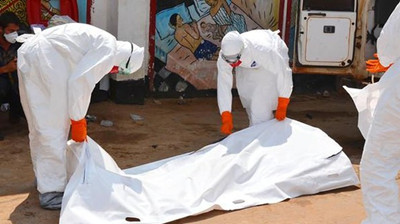埃博拉病毒
Chasing a rolling snowball
“雪球”越滾越大,防控刻不容緩
The world is still acting too slowly to stop Ebola
世界范圍內(nèi)阻止埃博拉病毒擴(kuò)散的行動(dòng)速度過慢
FOR months the world has sat largely idle as an Ebola epidemic has marched steadily from the remote jungles of Guinea to the slums of Liberia, and beyond. On September 16th that changed. Barack Obama announced the largest humanitarian deployment by America's armed forces to fight an infectious disease. Saying that the epidemic “is not just a threat to regional security—it's a potential threat to global security if these countries break down”, the president began the process of sending some 3,000 American troops to set up treatment centres with 1,700 beds and to train local health workers.
在過去的幾個(gè)月里,埃博拉病毒從幾內(nèi)亞偏遠(yuǎn)的熱帶雨林?jǐn)U散到了利比里亞的貧民窟甚至更遠(yuǎn)的地方,然而全世界對(duì)此卻無動(dòng)于衷,直到9月16日開始有所改變了。奧巴馬總統(tǒng)進(jìn)行了最大的人道主義救助部署,美國軍隊(duì)將會(huì)向這一傳染性疾病宣戰(zhàn)。他表示“這不僅僅是對(duì)地區(qū)安全的威脅,如果這些感染病毒的國家被拖垮的話,這將正為對(duì)全球安全的潛在威脅”3000名美國士兵已經(jīng)被派遣到當(dāng)?shù)亟⒅委熤行模撝行挠?700個(gè)床位,當(dāng)?shù)氐男l(wèi)生工作者也將受到訓(xùn)練。

The dispatch of troops to west Africa may seem an odd priority when American forces are preparing to confront jihadists in Iraq and Syria and are stretched thin elsewhere. Ebola is a disease that is usually absent from human populations, has been quickly stamped out in the past and in its worst recorded outbreak has thus far caused 3,000 known deaths (seearticle). Moreover it is unlikely to spread widely in rich countries with good health-care systems. Set against killers such as HIV, the virus that kills some 1.6m people a year, or tuberculosis (TB), which takes another 1.3m lives, an expensive fight against Ebola may seem a misallocation of resources.
將美國軍隊(duì)派遣到西非可能會(huì)看上去是一個(gè)奇怪的舉動(dòng),因?yàn)檫@時(shí)美國的軍隊(duì)大多在備戰(zhàn)伊拉克和敘利亞的圣戰(zhàn),其他地區(qū)的部隊(duì)為數(shù)不多。埃博拉病毒通常不會(huì)在人類中傳播擴(kuò)散,過去的歷史記錄中,它通常很快會(huì)不見蹤影,而最嚴(yán)重的爆發(fā)情況是造成了3000人死亡的記錄。并且這一病毒在醫(yī)療條件較好的富裕國家并不會(huì)大面積傳播。與此形成對(duì)比的是,像艾滋病這樣的病毒每年致死的人數(shù)多達(dá)160萬人,肺結(jié)核病毒的致死人數(shù)也多達(dá)130萬人。如果在對(duì)待埃博拉病毒上耗費(fèi)巨資的話可能是對(duì)資源的誤用。
Yet Ebola is now growing exponentially, with the number of new cases roughly doubling every three weeks or so. In Monrovia, the capital of Liberia, it is thought to be doubling every two weeks. Previous outbreaks were usually in rural villages where it was easier to contain. At this rate of progress, small numbers quickly become big ones, and there is a real risk of the disease spreading to cities such as Lagos, which is home to more than 10m people. The longer Ebola is allowed to replicate in humans, the greater the risk that it will become more contagious. Some virologists fret that it might even acquire the ability to be transmitted through the air by coughs and sneezes. Although this seems unlikely, nobody wants to find out just how quickly Ebola can adapt to humans.
然而,現(xiàn)在埃博拉病毒卻在成幾何級(jí)數(shù)擴(kuò)散,新發(fā)現(xiàn)的病例每三周將會(huì)翻一番。在利比里亞的首都蒙羅維拉,新病例每兩周就翻一番。之前病毒的爆發(fā)地通常是偏遠(yuǎn)村落,那里比較好控制。按照這種發(fā)展趨勢,感染人數(shù)很快就會(huì)由小變大,那么如果這一病毒擴(kuò)散到像拉各斯這樣的大城市的話,那么將構(gòu)成真正意義上的威脅,因?yàn)槟抢锞幼×顺^1千萬人。埃博拉在人類身上復(fù)制傳播的時(shí)間越長,那么它變得更具傳染性的風(fēng)險(xiǎn)就越大。一些病毒學(xué)家甚至擔(dān)心它會(huì)變成可以通過空氣和唾液傳播的病毒。盡管這似乎不太可能,但是沒人愿意等著看埃博拉病毒多久能適應(yīng)人類受體。
America's response is the first by a government on a large scale. Until now the burden has been carried by charities such as Médecins Sans Frontières (MSF), which has 2,000 staff in the affected countries. Yet even America's large commitment may not be enough to get ahead of this epidemic in Liberia, the country most affected. By the time the troops actually get there, the situation in Liberia could be far worse.
在政府層面對(duì)此作出大規(guī)模反應(yīng)的,美國是第一個(gè)。目前為止擔(dān)負(fù)最多責(zé)任的是像MSF這樣的慈善機(jī)構(gòu)。該機(jī)構(gòu)已有2000名員工在病毒感染國工作。盡管美國的決心很大,但是還不足以處理埃博拉病毒在利比里亞這個(gè)最大感染國的肆虐。等到軍隊(duì)過去的時(shí)候,情況可能要比現(xiàn)在糟糕的多。
Gloves and masks needed
急需手套和口罩
Elsewhere, the response falls far short of what is needed. Sierra Leone, the second-worst-affected country, has received far less help from governments: China is sending 174 people and mobile laboratory teams, Cuba is sending a similar number and Britain will set up a hospital with 62 beds. France is sending 20 people to the region.
在其它地區(qū)應(yīng)對(duì)措施遠(yuǎn)遠(yuǎn)不足。塞拉利昂這個(gè)第二大感染國接受到的政府援助少得可憐:中國派出了174人以及一支流動(dòng)實(shí)驗(yàn)隊(duì),古巴也正在派遣差不多的人員,英國將建立一所有62個(gè)床位的醫(yī)院。法國也正在派遣20名人員到該國。
Two things are urgently needed. The first is the rapid provision of basic protective gear such as gloves, gowns, surgical masks and disinfectant. Domestic health systems in affected countries have crumbled as nurses and doctors have fallen ill or died for lack of basic gear.
目前迫切需要做兩件事情。首先是迅速提供基本的防護(hù)裝備,如手套、隔離衣、口罩、消毒液。 感染國國內(nèi)醫(yī)療系統(tǒng)已經(jīng)崩潰,因?yàn)樽o(hù)士和醫(yī)生由于缺乏基本的裝備而病倒或者死亡。
The second need is for trained staff to run the treatment centres and work in them. Poorly run ones with weak infection controls may hasten the spread of the disease. Both are needed soon, as the cost of halting Ebola's spread is also rising exponentially. In August the World Health Organisation estimated that it would take nine months and cost $490m to contain Ebola. Now it reckons the cost has risen to over $1 billion. The longer the world prevaricates, the harder and costlier it will be to contain this outbreak.
第二件事是需要受訓(xùn)人員來管理治療中心并開始工作。管理不善以及不到位的感染防控可能加劇疾病的傳播。這兩件事都亟待解決,并阻止埃博拉病毒的幾何級(jí)數(shù)增長。今年八月,據(jù)世界衛(wèi)生組織估計(jì),需要用9個(gè)月花費(fèi)4.9億美元的資金才能控制在埃博拉病毒。先在估計(jì)這一金額將升至10億美元。全世界對(duì)此觀望的時(shí)間越長,那么想要控制疫情將耗費(fèi)更多的人力物力。












